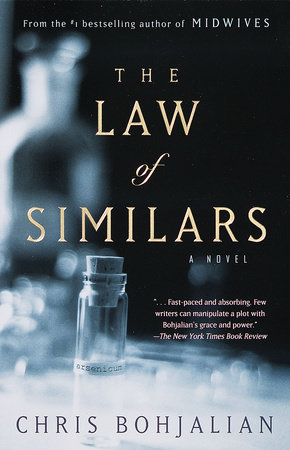The Law of Similars Reader’s Guide
By Chris Bohjalian


1) Carissa Lake is a psychologist as well as a homeopath. In what ways do these two disciplines reinforce each other in her treatment of patients? What effect do her questions about his personal life have on Leland? Does the success of Leland’s cure depend on his willingness to trust Carissa?
2) How does Richard Emmons’s motivation for trying homeopathy differ from Leland’s? Do you think that his fear of the long-term effects of conventional medicine is realistic and that Jennifer too willingly accepts the authority of the medical establishment?
3) Within a week of taking Carissa’s medication, Richard’s skin clears up and the aches in his joints diminish. In light of this, do you think his decision to give up the inhaler and pills he took for his asthma was reasonable? Do his actions justify Jennifer’s opposition to homeopathy or do they indicate a flaw within Richard himself? Should Carissa have recognized that Richard’s demands for more medication were a prelude to his decision to take matters into his own hands?
4) The two events at the heart of The Law of Similars occur almost simultaneously on Christmas Eve: Leland and Carissa make love for the first time and Richard attempts to medicate himself by eating cashews. What do these events reflect about the character of each man? Are there similarities between the risks they both take in hopes of creating a better future for themselves?
5) When Leland realizes that Carissa might be charged with a criminal offense because of Jennifer’s accusations, why doesn’t he leave Carissa’s house immediately? Is it wrong for him to put his feelings for Carissa above what he knows he should do as a lawyer? Discuss the distinction he makes between the “ethical” thing to do and the “moral” thing to do. [p. 135]
6) Carissa readily admits that she made a joke about eating cashews to Richard in the health food store. Do you think “Richard Emmons was an idiot who mistook an offhand remark…for medical advice”? [p. 139] Or did Carissa fail to live up to an essential professional obligation to answer Richard’s questions responsibly even in a light-hearted conversation?
7) At what point does Leland cross the line between his commitment to upholding the law and his commitment to Carissa? Should he have reported his involvement with Carissa to his boss and the state trooper immediately, even though no criminal charges were pending? Should he have refused to interview Jennifer Emmons?
8) Carissa accuses Leland of treating her like a criminal when he first questions her about her conversation with Richard, and Leland makes the same accusation when his boss presses him for the details about his relationship with Carissa. How do these two occasions differ from each other, and what do they reveal about Carissa’s and Leland’s understanding of the situation and its likely consequences?
9) Why does Carissa agree to doctor her notes on treating Richard? Do you think her deference to Leland is excessive? Does his insistence that she is only protecting herself from a possible miscarriage of justice exonerate her for participating in what she correctly believes is an illegal act? Do you think her ultimate decision to leave the United States was the only one she could have made in order to live as she wanted to?
10) Each chapter is introduced with a quotation from the works of Dr. Samuel Hahnemann, the founder of homeopathy. How do they add to your understanding of the book? Discuss their function as a backdrop–or gloss–for the actual events of the plot.
11) What is the significance of Leland’s increasing dependence on the arsenic pills he takes from Carissa’s office? How do his reactions over the course of the novel–from his initial exhilaration to the unpleasant physical symptoms and fears he suffers at the end–relate to the law of similars that informs homeopathy?
12) When Midwives was first published, it led to an often heated debate about the literal and metaphoric place of birth in our culture. Do you think The Law of Similars will stimulate an equally earnest discussion about the role alternative medicine should play in health care?
13) Chris Bohjalian has said that The Law of Similars is about forgiveness. How successful are the three main characters–Leland, Carissa, and Jennifer–at forgiving themselves and each other?